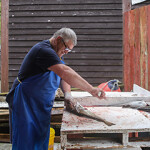Grieg Seafood terminates Skye operations, job losses expected

Bergen, Norway-headquartered Grieg Seafood will cease salmon farming operations at its five sites on the Isle of Skye in Scotland, citing the long distance between the Inner Hebrides island and its main operations on Shetland as the main reason for its decision.
An announcement posted on Grieg’s website stated that the distance was too great to operate the two areas as one unit, and that the Skye operation was too small to be operated as a separate unit. It was also determined that the transportation of resources and fish between Skye and Shetland had a high carbon footprint in comparison to other salmon farming operations.
The move follows a strategic evaluation of the group’s Skye operations, initiated in August 2019. The company said it will now look for alternative set-ups for these five farms outside the company.
“As we have had to move supportive equipment and resources for our Skye farms back and forth from the Shetland isles, we have regrettably not been able to maintain the fish welfare and production standards that we have in the rest of the company. Therefore, we have decided to end our operations in Skye and will look for alternatives for the farms and the remaining employees outside the company,” Grieg Seafood ASA CEO Andreas Kvame said.
The group also confirmed its decision was expedited due to an incident of high mortality at three of the Skye farms between late July and early September 2020, mainly caused by abnormal levels of jellyfish. This event caused the loss of 627,000 fish, representing approximately 1,500 metric tons (MT).
Operations at the impacted sites were discontinued with immediate effect, while operations at the two remaining farms will end after harvests in the coming months.
Grieg has 25 employees on the Isle of Skye, and the group expects that the decision will result in the loss of eight jobs.
Some of the employees will be able to continue working for the group should they want to relocate to Shetland, it said.
“I regret to say that the decision per now is expected to cause the loss of eight jobs in Skye, and we are in dialogue with our staff about that. Grieg Seafood is grateful to our Skye employees for the tremendous job they have done, especially over the last months with uncertainty due to our strategic evaluation and a challenging biology in the sea. I want to thank them for their dedication to our livestock and to Grieg Seafood,” Kvame said.
Blaming reduced prices and increased costs, Grieg Seafood last month posted second-quarter 2020 operational earnings before interest and taxes (EBIT) of NOK 3 million (USD 330,535, EUR 279,132) before fair value adjustment of biomass, down from NOK 302 million (USD 33.3 million, EUR 28.1 million) in Q2 2019.
It harvested 23,910 MT of gutted weight salmon in the quarter, which was 10 percent more than the corresponding quarter of last year. Regionally, British Columbia (BC) provided the most fish with 6,000 MT, followed by Shetland with 5,600 MT, Rogaland with 5,300 MT, and Finnmark 4,500 MT.
Photo courtesy of Grieg Seafood





Share